Translated by Students in Humboldt University Mongolian Politics Seminar
Below we’re offering a translation of Kh Battulga’s presidential campaign platform. We have already posted a translation of S Ganbaatar’s platform. But we’re still recruiting someone to translate MPP/M Enkhbold’s platform.
By providing an English translation, we want to make information available to non-Mongolian readers to allow them to get a sense of Kh Battulga (and the others) as a candidate. We have attempted to translate the platform to the best of our ability, but not to linguistic, rather to substantive standards.
If you have any comments on the translation, please do use the comment function below.
The translation was based on the version of the platform that appears on the GEC website.
A STRONGER MONGOLIA/ХҮЧИРХЭГ МОНГОЛ УЛС
I would be a patriotic/national president, who would build a prosperous ‘stronger Mongolia’, and who honours freedom, democracy, and justice, independent and sovereign Mongolia; where statehood is accounted for millennials and based on culture and history, tradition, modern accomplishments, and hope for bright future.
- A patriotic President, who honors unity, and emphasizes national interest
- A patriotic president, who protects freedom and just, and endorses the citizens
- A patriotic president, who builds a prosperous economy, and develops industry
- A patriotic president, who ensures ecological balance, and protects territory
- A patriotic president, who launches a new era for export, and prefers balanced foreign relations
1. President, who honours unity, and emphasizes national interest
- To defend fundamental rights of its people and country
To protect national interest with strong commitment by honoring Mongolian independence, sovereignty, territory integrity, inviolability of borders, democracy, freedom, human right, and justice.
- To accomplish national unity
As a Mongolian president who represents national unity, I will protect Mongolian statehood and will lead an undivided, developed and unified Mongolia against antagonism and partition.
-
President, who protects freedom und just, and endorses citizens
2.1. Human rights and Justice
2.1.1. Everyone’s equality before the law will be guaranteed.
2.1.2. Public service workers will be appointed on professional merit.
2.1.3. Corrupted public servants, owners of offshore accounts will be punished.
2.1.4. Public service will become less bureaucratic. An online platform for public service will be established.
2.1.5. Governmental organizations, budget allocation, state property will be controlled by the president and the public.
2.1.6. Freedom of speech, expression, assembly and press will be guaranteed. Independent and transparent media will be established.
2.1.7. Judicial independence will be ensured. Judges will be selected not only on professional merits, but also on personal morality.
2.2. Education, Culture, Art and Science
An educated, healthy and employed Mongolian citizen is the source of the country’s development and economic growth.
2.2.1. [???]
2.2.2. Traditions, customs, heritage of mongols and nomadic civilization, arts of national value will be patronized and promoted.
2.2.3. Engraining morality, patriotism to children and youth. Improving the internet infrastructure so that everyone gets access to knowledge.
2.2.4. Boost Sciences, Technology and Innovations
2.2.5. Supporting Specialists and Professionals
2.3. Health Care
The health care of a Mongolian citizen will be the core of the governmental policy. The right of the citizens to live in a safe and healthful environment will be fortified. Special attention will be payed to the citizens’ physical health and its improvement.
2.3.1. Health Care and Medicine will be updated with newest technologies. A Mongolian citizen will be able to get diagnostics and treatments of highest level in his homeland.
2.3.2. In order to make medical care available to every citizen complex medical centers of international standards will be developed in regions.
2.3.3. Preventive care and services will get more financial support. With their insurance citizens will be able to swim in water sport centers.
2.3.4. Reduce diseases; support healthy lifestyle;
2.3.5. Develop the sports infrastructure by supporting national sports, sport medicine and athletes;
2.4. Public Service
An ethical and cultural sphere will be created, where a Mongolian public servant can formulate and implement policies and work creatively for a citizen-based society respecting the Mongolian governing tradition. The Military, Court and Police are seen as encouragers to obey the law and mainstay of the state’s independence. Therefore, rights of all public servants will be respected.
2.4.1. Public service will be professional, able and well-organized. Selection of public servants will base on their experience, talent and creativity.
2.4.2. Public servants will be provided with fair salary and working space for a stable, fast and efficient work.
2.5. Social security
Every citizen, who is in need of social security and assistance will be maintained and an environment for their social engagement will be created.
2.5.1. Appropriate maintenance to target groups will be provided. Obtain fair pensions;
2.5.2. Equal rights for public and social services for disabled citizen will be guaranteed. A special infrastructure will be established for them.
2.6. Families, senior citizens, females and children
A Family is a source unit of the existence of a nation. Therefore, a policy endorsing households will be implemented.
2.6.1. Promote the positive influence of family, family planning and its stability on social relations;
2.6.2. Create necessary conditions for mothers to give birth, raise their children; Keep mothers employed, support them economically and financially; Support large families with many children by accommodating them;
2.6.3. Support the children of single-headed households, low-income families, or disabled citizens; Guarantee them full educational service;
2.6.4. Support of low-income and single-headed households with children under 3 years old;
2.6.5. Enhance women’s leadership and involvement in decision making; Fight with domestic violence;
2.6.6. Guarantee and protect the rights of every single child;
2.6.7. Create optional employment opportunities for senior citizens;
2.6.8. Develop and support elderly care;
2.6.9. Encourage social and cultural leadership and creativity to youth;
2.6.10. Provide students with part time jobs; Job guarantee for graduates;
2.6.11. Support the „Soldier student“ program in order to engrain patriotism to youth;
2.6.12. Make the selection process of students who will study abroad fair and transparent; Double the number of bachelor, master and doctoral students who will study in developed countries;
2.6.13. Fight against youth smoking, alcohol consumption and drug use.
2.7. Support of herders and farmers
Special attention will be payed to social problems of herders, who carry the traditional nomadic culture, and farmers, who supply the people with products obtained from our homeland. Every effort will be made to increase their economic growth.
2.7.1. Increase the value of farm and livestock products; Improve the living conditions of farmers and herders;
2.7.2. Production and export of processed farm and livestock products.
2.7.3. Increase quality of livestock by introducing new technologies, creating new breeds, improving veterinary etc.
2.7.4. Encourage people living in border areas to involve in border guard services;
2.8. Decentralization, new cities, rural development
2.8.1. Develop tourism, production in rural areas;
2.8.2. Develop rural areas;
2.8.3. Rational allocation of administrative organizations; make public service accessible;
2.8.4. Add more green zones and build reservoirs in cities;
2.8.5. Guarantee security of the citizen;
2.8.6. Convert and develop ger districts; solve the air and soil pollution problems;
2.8.7. Develop sum centres.
-
President, who makes the economy prosperous, and develops industry
To give importance to implementation of policies to restructure the economy and to make it more diversified, ensuring economic growth through innovation-based industrialization, and creating employment. To work with in accordance with ‘Mongolia Sustainable Development Vision – 2030’ approved by State Great Khural of Mongolia (19th Protocol) on 5th February, 2016. That includes:
3.1 Industrialization is the key for development
3.2 Banking and Stock market
3.3 Special attention to middle income group
3.4 Mining policy in accordance with national safety
3.5 To save up income from natural resources and make policy for developing non natural resource sectors, and for creating employment
3.6 Equal distribution of natural resource income
3.7 To build industrial park including steelworks, copper mill, petrochemical refinery
3.8 From brown to green economy
3.9 Employment
3.10 One nation – One Soldier: To involve soldiers for big national establishments in order to provide them profession skills required while having income at the same time
3.11 Support wealth creation by eliminating state intervention, examination and taxation, and corruption
3.12 To develop economic passage between two neighbours, and to develop economic relations with the two neighbours as well as with 3rd neighbors
3.13 To build transnational railroads
3.14 Renewable energy
3.15 Financial and Investment market
-
President, who ensures ecological balance, and protects homeland
Special attention to appropriate use of Mongolian natural resources, to keep the ecological balance by reducing climate change (?), greenhouse gas, human and industrial harm on the nature, and to hand over pristine nature for our future generation.
4.1 Eco-friendly technology
4.2 Climate Change
4.3 Air and soil pollution
4.4 Waste to energy policy
4.5 Taxation policy on ecofriendly technology
4.6 Tourism
4.7 To support initiative of any kind to process raw coal and shale
4.8 Water protection
4.9 Protection of critically endangered plants and animals
-
President, who launches a new era for export, and prefers balanced foreign relations
The leading principals of president’s foreign policies are to protect Mongolian independence, self-preserved sovereignty, territorial integrity, inviolability of borders; to reassure the democracy chosen by people of Mongolia; and equal cooperation which is in interest of nation.
Special attention to mutually beneficial cooperation at regional and international level in order for economically free, independent, and accelerated development. To expand market for product and knowledge which are made in Mongolia.
Active and friendly policy to all Mongols living worldwide and soft power diplomacy through promotion of Mongolian history, national heritage, and pride at international level.
5.1 Foreign policy which protects national interest
5.2 Foreign policy which puts economy first
5.3 Bilateral economic relation with Russian Federation and People’s Republic of China
5.4 Regional economic integration through railway, airway, and expressway
5.5 Foreign investment and trade
5.6 Taxation on foreign trade
5.7 Third neighbor policy
5.8 India, Central Asian countries, Turkey
5.9 Foreign policy independent from political divide
5.10 Mongolians living abroad
5.11 Mongolians visiting abroad
5.12 Active participation in UN and in other international organizations
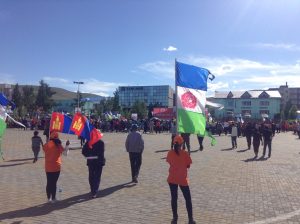 The rally was held on the main square of Tsetserleg, in front of the aimag administration where campaign workers had been setting up the stage since some time in the morning.
The rally was held on the main square of Tsetserleg, in front of the aimag administration where campaign workers had been setting up the stage since some time in the morning.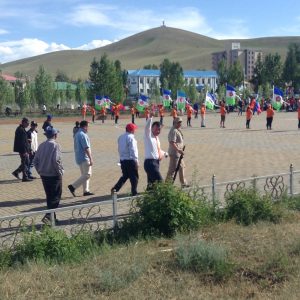
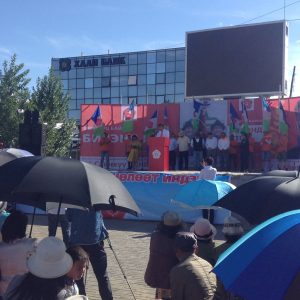 After lengthy introductions and endorsements by some local celebrities, as well as an aged herder, and a young voter, Ganbaatar gave a fairly short speech. Like his campaign platform, it was a fairly high-level speech, i.e. about Mongolia, values, and how he is the option that is a true alternative to MANAS. He got some polite applause, but it was not a crowd that seemed like enthuses protest voters that were thrilled that their candidate had appeared to them.
After lengthy introductions and endorsements by some local celebrities, as well as an aged herder, and a young voter, Ganbaatar gave a fairly short speech. Like his campaign platform, it was a fairly high-level speech, i.e. about Mongolia, values, and how he is the option that is a true alternative to MANAS. He got some polite applause, but it was not a crowd that seemed like enthuses protest voters that were thrilled that their candidate had appeared to them.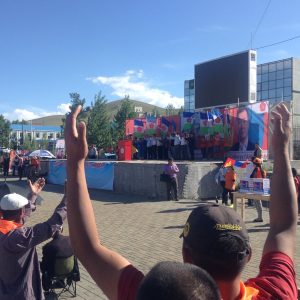 Nevertheless, the crowd offered him a big cheer.
Nevertheless, the crowd offered him a big cheer.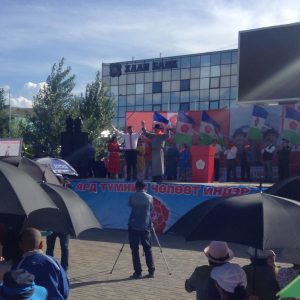
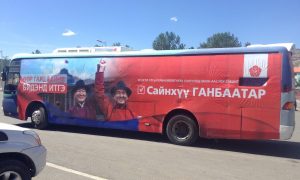 That scene also appears on their campaign bus.
That scene also appears on their campaign bus.
 Follow
Follow